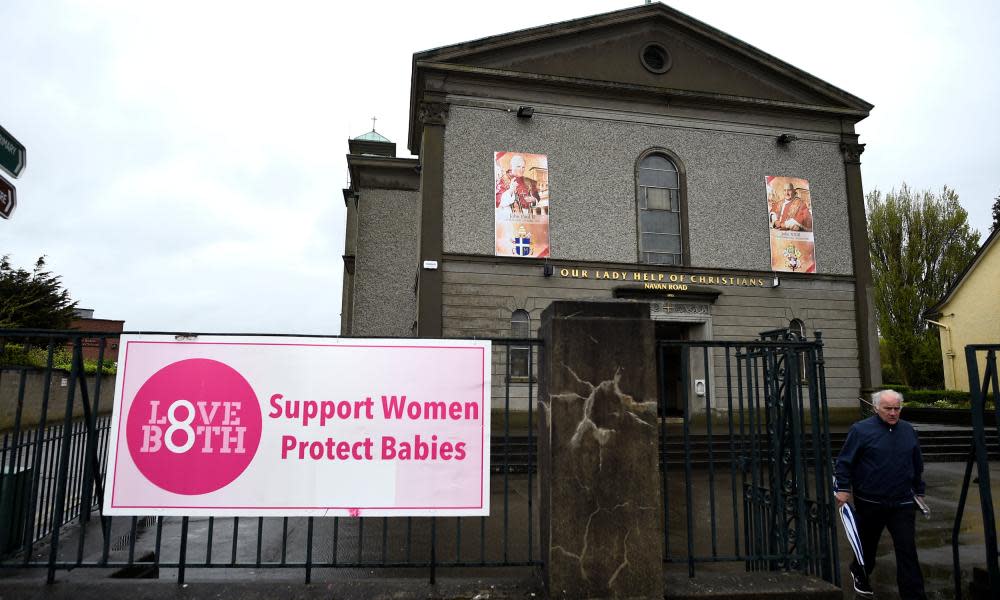My parents and ‘middle Ireland’ could decide Ireland’s abortion vote

When Irish people vote in Friday’s referendum on whether to repeal the country’s constitutional ban on abortion we will vote on a practicality: do we allow women to access healthcare in their own country? Because women in Ireland already have abortions. They have them in Britain, the Netherlands, or elsewhere in Europe. They also have them illegally in Ireland, by taking abortion pills bought online.
But the vote is also about something more profound – it is about confronting a historical social context and the enduring legacy of a dogmatic Catholicism that historically sought to control women’s sexuality.
Anti-abortion campaigners go to great lengths to divert the conversation away from religion, taking offence when the role of the church as an oppressive force over women’s rights, pregnancy and sex is highlighted. This is disingenuous, and ignores the roots of the eighth amendment.
The clause, inserted into the constitution in 1983 in an attempt to keep abortion outlawed in Ireland, was lobbied for by the Catholic right. These are the same, or similar, forces to those that mobilised against contraception, divorce, marriage equality, sex education in schools and legislation allowing for abortion in the case of serious risk to a mother’s life.
This legacy is important, not least because conservatism and theocracy are lenses through which much of the rest of the world generalises about Ireland, but it’s also a context that moments such as this referendum allow us to reflect on and unpack.
The global significance of this referendum cannot be ignored either. On the Facebook pages for the no campaign, American voices are prominent, with the Christian right in the US seeing the Irish referendum as part of the backlash against abortion rights in some US states and beyond. Irish activists are also mindful of a restrictive climate in Argentina, Chile, Poland and elsewhere. If the marriage equality victory in Ireland inspired activists globally, an Irish referendum win on abortion would be a rare bolstering moment in a global context where the trend is towards abortion rights being reversed, not won.
As an Irish woman in my thirties, I received little sex education in school, and abortion was spoken about as murder. This absolutist position is at the heart of a no campaign that has framed its anti-choice argument in the baldest terms: that abortion is killing, and forced pregnancy is the answer to women not wanting to be pregnant, even in cases of incest, rape, or after receiving a diagnosis of a fatal foetal abnormality. As the campaign has progressed, the no campaign has become more entrenched, plastering sensationalist posters and banners around the country showing images of foetuses, babies, pregnant women’s torsos, and so on. It is a strategy that has in some ways backfired.
A majority of Catholics in Ireland will have to vote yes for this referendum to be carried. According to the most recent census, over 78% of people in Ireland consider themselves Catholic. Yet Catholicism is a malleable state for many Irish people. They regard themselves as “culturally Catholic” but exist in a religiously ambiguous space, participating in sacraments, churchgoing, and a general Christian code, as it were, yet now rejecting the more hardline Catholic doctrine, irritated by a hierarchy that is often detached and dogmatic or lacking in human compassion.
I recently had a long conversation with my parents about the referendum. Now in their 70s, they grew up in rural Ireland but left relative poverty behind for lower-middle-class suburbia in Dublin. They are part of the “middle Ireland” politicians and media commentators talk about: mass-going Catholics, pensioners, fans of GAA (Gaelic sports), people who have the radio on all day and rarely miss a news bulletin.
They voted for the insertion of the eighth amendment in 1983, the year I was born. My father taught religion for 40 years, and is now voting to liberalise the abortion law. His position is a thoughtful one. “Coming from a rural, traditional background, I would have maintained traditional Catholic values,” he said. “But through time, I’ve come to the conclusion that it’s not my business to tell anybody – and certainly women – what to do … I feel that it’s easy for people of my age, my generation, to lay down the law about women in that situation [a crisis pregnancy].
“Times have changed … I notice that the very people who are now campaigning very vigorously for a no vote – and again that is their right – they’re the very people who opposed the marriage referendum. I get the feeling that on occasions of sexual morality, these people seem to appear out of nowhere, very well-funded, very articulate, and obviously very well-connected. They want to maintain the status quo, for whatever reason, I don’t know.”
My mother is not just voting yes, but has been canvassing for the campaign to repeal the eighth. She and my father are both people who do not see their deep faith as incompatible with voting yes to repeal. The behaviour of the church throughout the campaign – bishops speaking about reproduction, lay people invited to preach anti-abortion messages at mass, and so on – has irritated and hurt them.
Support for repeal of the abortion ban is highest among the 18-24 age group in urban areas, and lowest among the 65-plus age group in rural areas. But while the youth vote is crucial, the maturity, reflection, and empathy of older voters will also be key. A population realising that religion cannot be used as leverage to deny women rights shows a maturity that the grandparents of Ireland are perhaps ready to articulate. That is as seismic as any “youthquake”.
• Una Mullally is the editor of Repeal the 8th, an anthology of writing about reproductive rights in Ireland

 Yahoo News
Yahoo News 
